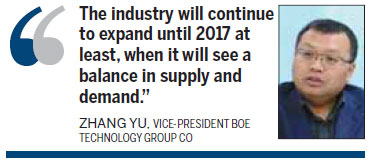

BOE only started to make a profit in 2011, when other companies making panel displays were also suffering from the global economic downturn.
"Sometimes you survived only because you kept at it. In terms of panel manufacturing, you can only live best when you live the longest," Zhang said.
A latest line of generation 8.5 in Beijing has cost the company 28 billion yuan. BOE's total investment will cost a further 100 billion yuan, if the assembly line at Ordos and another in Beijing are completed.
It is no wonder why BOE purchased shares in the Bank of Chongqing in late October, worth nearly $20 million. It was a bid to strengthen cooperation with Chongqing's government and local financial institutions.

To cement its supply of advanced display production equipment and to cut costs, BOE also teamed up with California-based Applied Materials Inc, a leading semiconductor equipment manufacturer, in August.
"The industry will continue to expand until 2017 at least, when it will see a balance in supply and demand," Zhang predicted.
Li Yaqin, head of research at Sigmaintell Consulting Co, a company providing panel industry consultancy, agreed that the panel production industry is facing a golden opportunity at the moment.
"Tablets measuring 5 inches (12 centimeters) are replacing tablets of 3 inches, which used to be standard for smartphones. In addition, it will take time to turn any investment into profits," she said.
Dong Yikai, a researcher at the National Engineering Laboratory of TFT-LCD Materials and Technologies, said the recovery of the whole industry may still face uncertainty because it is heavily affected by an increase in import tariffs.
China raised the import tariff on LCD panels to 5 percent starting in April 2012, at a time when several domestic LCD production lines had gone into operation, changing the market's dynamics.
Previously, China placed a 3 percent tax on imported LCD panels of 32 inches or bigger (excluding backlit modules) in size, in order to spur development of the country's booming television manufacturing sector, which is heavily reliant on LCD panel imports.
Dong said the tariff will have a positive effect on Chinese LCD panel and television manufacturers, because it will increase their competitive edge.